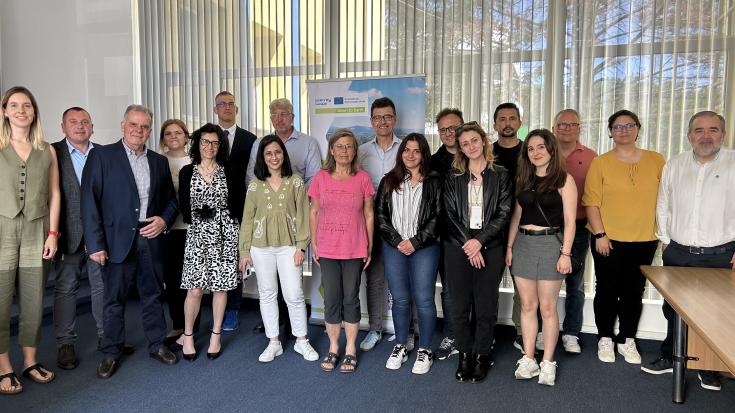Study Visit in Romania

Down to Earth partners together with regional stakeholders were in Romania for the project's 5th Study Visit in June 2025.
The visit, organised by partner Meteo Romania (National Meteorological Administration), focused on climate-related challenges in light of Year 3's theme: policy instruments that foster the role of farmers and land managers in fighting climate change and environmental risks. The Consortium met with experts, authorities and land managers during three days of fruitful exchange.
Day 1
The study visit kicked off at the Meteo Romania's headquarters in Bucharest, where the Consortium held a management meeting. In addition to general project matters, focus was placed on improvements to the regional policy instruments. As the project enters its final core-phase year, partners presented their related action plans.
After the meeting, we visited Meteo Romania’s offices, where we were introduced to the main tasks performed by staff at the meteorological station and engaged in discussions about changes in climate patterns in recent years.

In the afternoon, we headed to the Călărași County. First, we visited the Iliuță farm, which covers over 5000ha. We learned about the exploitation’s irrigation system: given the increasingly frequent climatic stress in the region (particularly draughts), such technologies appear essential for maintaining crop performance and productivity. We also learned about Romania’s national plans to rehabilitate the country's water infrastructure, linking the Danube River to agricultural areas with the support of EU funds. Other support measures, such as energy subsidies, were also discussed.
We then went to Ilya Agro, a dairy farm for milk production and processing, where we also discussed the use of advanced technologies and digital tools for improved farm efficiency. The day concluded with a visit to Jegălia, Romania’s largest horse breeding and equestrian ecotourism farm.

Day 2
The second day took project partners and stakeholders to the Ilfov County. Our first stop was the Romanian Farmers Club, where we were welcomed by Mr. Dan Grigore, coordinator of the Agrinnovator Think Tank. Grigore outlined Romania’s agricultural challenges and key development policies. He also introduced us to the Farmers Club main initiatives: training programmes, advisory services, attraction of funding, dialogue with legislative bodies, and research.
We were presented with four of the think tanks in further detail: the coordinators explained their work with digital tools, circular economy, regenerative agriculture and efforts towards joint legislation. The Consortium learned not only about their work with experimental techniques and innovative digital tools for data collection, monitoring and resource efficiency, but also about financial knowledge trainings and a young leaders programme. Two presentations on the use of advanced technologies for agriculture followed: on drones for efficient water irrigation and digital tools for tailored crop monitoring.

Afterwards, a Q&A session took place. Down to Earth partners exchanged on generational renewal and the use of innovative tools with the presenters.
Later on, we travelled to Popești–Leordeni and met the managers at ITC Seeds, an innovative family farm working with seeds for increased crop efficiency. There, the Consortium was introduced to research initiatives focused on breeding seed varieties and developing species resilient to climate stress and altered harvest cycles. It provided an ideal opportunity to discuss climate change adaptation strategies for farmers, highlighting a case where technology is applied to the seeds rather than the crops themselves. In this enterprise, the land is irrigated naturally.

Our discussions continued in the afternoon, when we headed to visit a farm in Găujani. There again, we observed climate-resilient farming tecniques in the fields and exchanged on apps for sustainable and efficient water irrigation and the monitoring of extensive agricultural lands.

Day 3
The last day started with a visit to the Dragalina Poultry Farm, in Călărași. The Consortium was received by the farm’s managers and given an overview of their work in poultry production. We discussed funding schemes funding for technologies that monitor animal health and weight.

We then headed to Slobozia to visit Diami Dairy Farming & Milk Processing Factory. The managers gave us an overview of the factory’s history, including the funding they secured to access newer, more efficient technologies. Before touring its facilities, we attended a presentation by Mr. Gabriel Gârban, representative of the Agency for Financing Rural Investments. Gârban explained AFIR's mission and introduced the agency's measures to accelerate the absorption of European funds in the country, as well as the impacts of their programmes.

The visit underscored the role of technology and research as key drivers of resilient, future-ready agricultural practices.
